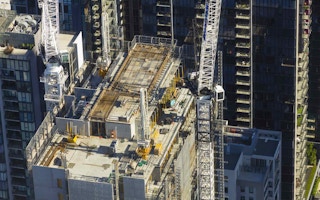The global steel industry last week converged on Sydney to lay the foundations for a new global certification scheme that has been five years in the making.
To be launched in 2017, the Responsiblesteel scheme will extend well beyond environmental criteria to take into account ethical and community considerations as well as reporting, product design and biodiversity.
Through the newly formed not-for-profit Steel Stewardship Council (an offshoot of the Steel Stewardship Forum), the scheme has been driven by Australian industry, despite its minnow status in terms of steel production globally.
“This is a coup for Australia,” said Ross Davies, national sustainability manager for Bluescope Steel, a council member and key proponent of the scheme.
“This meeting in Sydney is the first time this has happened, the first time the steel industry has met on the subject of stewardship face-to-face.”
He said the council members would also meet with 30-40 key stakeholders including property companies, specifiers, consultants, banks and other key players that have been involved in the development of the scheme to date.
The focus of discussions so far has been how to develop the scheme from an Australian pilot to a global scheme and whether to target the top 25 per cent of the market or the “large chunk of the bell curve”.
“The position was that we want to move the bulk of the market along this route,” Mr Davies said, “and that is, in some respects, a bigger challenge but makes it easier to determine what we do moving forward.”
Global steel giant ArcelorMittal has been involved as a council member and its general manager of corporate responsibility, Alan Knight, told The Fifth Estate: “Certification schemes are coming on for concrete, aluminium… we’re entering a world where an assurance scheme that nothing bad is happening in your supply chain is the norm.
“
I can point to a steel billet and tell you that will never be thrown away. In a thousand years that billet will be used somewhere in the world. Timber and concrete can’t do that.
Alan Knight, general manager of corporate responsibility, ArcelorMittal
“I think for the steel sector to not be part of that movement will put us at a disadvantage.”
He believes certification will follow a similar course to what has occurred in the forestry sector, where there is a “first mover” advantage to companies providing independent certification that then becomes business-as-usual over the next 10 years.
For specifiers and users of steel, certification will provide clear differentiation between suppliers and reduce the time and risk involved in choosing suppliers and products. Some current voluntary green building and rating tools will also recognise and credit supply chains certified by Responsiblesteel.
But what are customers most concerned about? Obviously steel suppliers face challenges in a carbon-constrained world, in regard to their use of virgin materials and manufacturing impacts. However, lifecycle analysis and environmental product declarations like those offered with Bluescope’s products are compelling.
Mr Knight said the construction industry has started looking at raw materials as it has reached a stage where it can “only do so much through design”.
“We are seeing people comparing steel, timber, aluminium, concrete… other materials tend to get favoured but we feel we are better.
“Many customers are doing their own LCAs and they say steel comes out well and as we become more sophisticated about how we measure the sustainability of steel it will be favoured.”
One of the biggest advantages of using steel is its high recyclability, which has led to a healthy global market in its trade and re-use.
Mr Knight says the steel-making process also provides sustainability advantages to third parties by blast furnaces providing heating and energy for communities and feedstock for the cement industry.
“The biggest difference we can make to the carbon footprint is in finding commercial uses for CO2,” Mr Knight said, adding that the company is exploring technologies to turn carbon into jet fuel and plastics.
Mahindra Sanyo Specialist Steel, a Steel Stewardship Council member, has adopted oxyfuel technology, specifically to reduce its carbon footprint. Its general manager of business excellence, Ramchandra Rane, told The Fifth Estate: “We can’t think of a world without steel, as long as it’s recyclable.” The company imports scrap steel from all over the world to make its products.
He said taking a “natural capital” approach to steel-making required Mahinda to identify issues of materiality.
“We had around 70 issues to start with,” he said. “Prioritising was required in consultation with different stakeholders and we ended up with 12 issues, with water being one of the important ones.
“Doing a lifecycle assessment was one of the triggers to go ahead with our water journey that started in 2012 and has brought our water consumption down by 70 per cent,” Mr Rane said, adding that further lifecycle assessment has enabled the company to set medium and long-term strategies, and to identify which products to focus upon.
Mr Knight said the process of certification could seem “overwhelmingly complicated” at first but it works to “deconstruct it”.
“What are the biggest, most material issues customers are concerned about? They are concerned about mining as part of the supply chain.
“The principle is straight forward – what does best practice look like? If you come up with a good mining standard and good production standard then you put them together under the one scheme, in that there is a load of detail,” he said.
Mr Knight added that it’s important to remember that steel is never “thrown away”.
“I can point to a steel billet and tell you that will never be thrown away. In a thousand years that billet will be used somewhere in the world. Timber and concrete can’t do that.”
This story was published with permission from The Fifth Estate.










